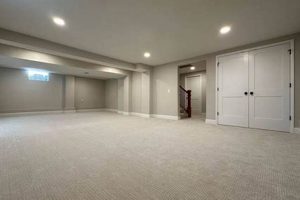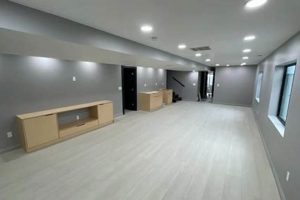The act of converting an unfinished lower level in residences within the state involves transforming a raw, often concrete-walled space into a habitable area. This undertaking typically includes framing walls, installing insulation, running electrical wiring, plumbing (if adding a bathroom), and applying finishing touches such as drywall, flooring, and paint. As an example, a homeowner might choose to convert a storage area into a recreation room, home office, or additional living space.
Undertaking such a project can significantly increase a home’s value and usability. It offers an affordable alternative to moving when more living space is desired. Historically, these spaces were primarily used for storage and utilities; however, modern homeowners are increasingly recognizing their potential for creating functional and enjoyable areas within their homes. The benefits extend beyond monetary value, providing enhanced comfort and lifestyle improvements.
The following sections will delve into key considerations for undertaking this type of renovation, including planning and design, code compliance, material selection, and contractor selection to ensure a successful and legally sound outcome.
Guidance for Lower Level Completion in New Jersey
Successfully completing the lower level of a New Jersey residence requires careful planning and adherence to regulations. The following guidance aims to assist homeowners in navigating this process effectively.
Tip 1: Comprehensive Planning: Prior to commencing any work, develop a detailed plan. This plan should include a scaled drawing of the proposed layout, specifying the location of walls, doors, windows, electrical outlets, and plumbing fixtures. Obtain any necessary permits before initiating construction.
Tip 2: Code Adherence: New Jersey mandates specific building codes for habitable spaces. Ensure that the proposed design meets all requirements pertaining to ceiling height, egress windows (for emergency exits), smoke detectors, and fire-resistant materials. Consult with local building officials to clarify any uncertainties.
Tip 3: Moisture Management: Basement environments are prone to moisture. Prior to installing insulation and finishing materials, address any existing dampness issues. This may involve improving exterior drainage, applying a waterproof sealant to the foundation walls, or installing a vapor barrier.
Tip 4: Adequate Insulation: Proper insulation is crucial for maintaining a comfortable temperature and reducing energy costs. Select insulation materials with a high R-value suitable for below-grade applications. Consider using closed-cell spray foam insulation for its superior moisture resistance.
Tip 5: Professional Contractor Selection: Engaging a qualified and licensed contractor is essential for ensuring quality workmanship and code compliance. Obtain multiple bids from reputable contractors, verify their licenses and insurance coverage, and review their past work and references.
Tip 6: Egress Window Installation: If the planned space will be used as a bedroom, the installation of an egress window is typically required by code. The egress window must meet specific size and operability requirements to allow for safe exit in the event of a fire.
Tip 7: Electrical Considerations: All electrical work must comply with the National Electrical Code (NEC) and local regulations. Use ground fault circuit interrupters (GFCIs) in areas prone to moisture, such as bathrooms and near plumbing fixtures. Engage a licensed electrician to perform all electrical wiring.
Homeowners who prioritize meticulous planning, code compliance, and the selection of qualified professionals are more likely to achieve successful lower level completion, resulting in a valuable and enjoyable addition to their residence.
The subsequent sections will focus on best practices for long-term maintenance and safeguarding the investment made in this valuable space.
1. Legal Permits
Legal permits form the foundational compliance layer for any lower-level completion project in New Jersey. These permits ensure adherence to local and state regulations, safeguarding the structural integrity of the property and the well-being of its occupants. Failure to obtain necessary permits can result in costly fines, project delays, and even the requirement to dismantle unapproved work.
- Zoning Compliance
Zoning regulations dictate permissible land use and building characteristics within a specific municipality. Before commencing any work, the proposed project must align with zoning ordinances, which may dictate allowable square footage, setback requirements, and permissible uses of the space. For instance, a municipality might prohibit the creation of a separate rental unit within a single-family home, even if it’s in the lower level. Non-compliance can lead to legal action and the forced alteration of the completed space.
- Building Code Adherence
Building codes establish minimum safety standards for construction, encompassing structural integrity, fire safety, electrical systems, and plumbing. Obtaining a building permit necessitates submitting detailed plans that demonstrate compliance with these codes. Examples include requirements for minimum ceiling height, egress windows in bedrooms, and the use of fire-resistant materials. Inspectors will verify adherence to these codes during construction, ensuring the safety and longevity of the renovation.
- Electrical and Plumbing Inspections
Electrical and plumbing systems require separate permits and inspections to ensure safety and compliance with the National Electrical Code (NEC) and Uniform Plumbing Code (UPC), respectively. These inspections verify that wiring is correctly installed, grounding is adequate, and plumbing fixtures are properly connected and vented. Inadequate electrical work can lead to fire hazards, while improper plumbing can result in water damage and health concerns.
- Environmental Regulations
Depending on the scope of the project, environmental regulations may apply, particularly regarding lead paint abatement or asbestos removal in older homes. These regulations are designed to protect occupants from hazardous materials. Prior to commencing any demolition work, it is imperative to assess the presence of these materials and obtain the necessary permits for their safe removal and disposal.
The process of securing legal permits is integral to a successful lower-level completion. Neglecting these requirements exposes homeowners to significant legal and financial risks, while adhering to the permitting process ensures a safe, code-compliant, and valuable addition to the property. This proactive approach minimizes potential complications and protects the homeowner’s investment.
2. Waterproofing Solutions
Waterproofing solutions constitute a critical prerequisite for any lower-level finishing project in New Jersey. Basements, by their subterranean nature, are inherently susceptible to moisture intrusion from groundwater, precipitation runoff, and hydrostatic pressure. The absence of effective waterproofing measures can lead to a cascade of detrimental consequences, compromising the structural integrity of the finished space and creating an unhealthy living environment. Water seepage can manifest as dampness, mold growth, efflorescence (salt deposits), and even structural damage to foundation walls. This moisture not only degrades building materials such as drywall and flooring but also fosters the proliferation of mold spores, posing significant health risks to occupants. Consider, for instance, a homeowner who invests in finishing a lower level without addressing a pre-existing water leak. Over time, the moisture will wick up into the drywall, creating a breeding ground for mold, necessitating costly remediation and potential health problems.
Various waterproofing methods are available, each suited to specific conditions and budgets. Exterior waterproofing involves excavating around the foundation and applying a waterproof membrane to the exterior walls, preventing water from penetrating the structure. Interior waterproofing typically involves applying a sealant to the interior walls and installing a drainage system to channel water away from the foundation. Sump pumps are often used in conjunction with interior drainage systems to actively remove water that accumulates. The selection of appropriate waterproofing solutions depends on factors such as the severity of the moisture problem, soil conditions, and budget constraints. A professional assessment by a qualified waterproofing contractor is essential to determine the most effective approach. Proper installation is equally critical; a poorly installed system can be ineffective or even exacerbate the problem.
In conclusion, waterproofing solutions are not merely an optional add-on but rather an integral component of a successful lower-level finishing project in New Jersey. Prioritizing effective waterproofing measures safeguards the investment, protects the health of occupants, and ensures the long-term durability and habitability of the finished space. Neglecting this critical aspect can result in costly repairs, health hazards, and a diminished property value. This understanding is vital for New Jersey homeowners planning these improvements.
3. Egress Compliance
Egress compliance represents a paramount safety consideration within the context of basement finishing in New Jersey. Building codes mandate specific requirements for emergency escape and rescue openings in habitable lower-level spaces, particularly bedrooms. The primary impetus behind these regulations stems from the inherent risks associated with below-grade environments, where occupants may face limited exit options in the event of a fire or other emergency. Failure to adhere to egress standards can have severe consequences, potentially leading to injury or loss of life. An example highlighting this importance would be a fire breaking out upstairs, blocking the main route of escape; proper egress allows anyone in the finished basement to escape safely and quickly.
Egress compliance typically entails the installation of an egress window or door meeting specific size and operability criteria. Regulations stipulate minimum dimensions for the clear opening of the window or door, ensuring that occupants can readily escape and that emergency personnel can easily access the space. Additionally, the window well (if applicable) must provide sufficient space for a person to fully exit the opening. The placement and design of egress openings are carefully regulated to maximize their effectiveness in providing a safe and unobstructed escape route. Many municipalities require professional inspection and certification of egress window installations to verify code compliance.
In conclusion, egress compliance is not merely a regulatory formality; it is a life-saving measure. Integrating code-compliant egress solutions into lower-level renovation plans is essential for protecting the safety and well-being of occupants. Overlooking these requirements exposes homeowners to significant liability and undermines the value of the finished space. Therefore, understanding and adhering to egress regulations is a non-negotiable aspect of responsible basement finishing in New Jersey.
4. Qualified Contractors
Engaging qualified contractors for lower-level completion projects in New Jersey is paramount, as the complexities of these renovations necessitate specialized expertise. These professionals possess the knowledge and skills to ensure code compliance, structural integrity, and overall project success, mitigating risks associated with improper construction and potential safety hazards.
- Code Compliance Expertise
Qualified contractors possess in-depth knowledge of New Jersey’s building codes, including those specific to lower-level construction. This expertise ensures adherence to regulations pertaining to ceiling height, egress windows, fire safety, and electrical wiring, preventing costly rework and potential legal liabilities. For example, a contractor familiar with local codes will understand the precise requirements for egress window size and placement, avoiding violations that could delay project completion or result in fines.
- Structural Assessment and Remediation
Lower-level spaces often present unique structural challenges, such as foundation cracks, moisture intrusion, or inadequate support. Qualified contractors can accurately assess these issues and implement appropriate remediation strategies, ensuring the long-term stability and safety of the renovated space. An experienced contractor, upon discovering cracks in the foundation, can recommend and implement solutions like epoxy injections or foundation reinforcement to prevent further deterioration.
- Efficient Project Management
Competent contractors possess the organizational skills to manage all aspects of the lower-level completion process, from initial design and permitting to material procurement and subcontractor coordination. This efficient project management minimizes delays, controls costs, and ensures a smooth and timely project completion. An organized contractor will establish a clear timeline, manage subcontractors effectively, and communicate regularly with the homeowner to keep the project on track.
- Warranty and Liability Protection
Reputable contractors typically offer warranties on their workmanship, providing homeowners with recourse in the event of defects or issues arising after project completion. Additionally, they carry liability insurance, protecting homeowners from financial losses resulting from accidents or property damage during construction. Selecting a contractor with appropriate insurance coverage safeguards the homeowner from potential legal and financial risks associated with construction-related incidents.
The expertise provided by qualified contractors extends beyond mere construction skills; it encompasses code compliance, structural assessment, efficient project management, and warranty protection, all contributing to a successful and safe lower-level completion project. Prioritizing the selection of qualified professionals mitigates risks, ensures code adherence, and protects the homeowner’s investment in creating a valuable and enjoyable living space.
5. Local Codes
Local codes exert a significant influence over lower-level completion projects within New Jersey, often dictating the permissible scope and methods of renovation. These codes, which vary by municipality, establish minimum standards for safety, habitability, and structural integrity. Compliance is not optional; it is a legal mandate that protects both homeowners and future occupants. For instance, one municipality might mandate a specific type of fire-resistant drywall in finished basements, while another might have stricter requirements for ceiling height or egress window dimensions. Ignoring these localized requirements can lead to project delays, costly rework, and potential legal repercussions.
The practical significance of understanding local codes cannot be overstated. Before initiating any construction, homeowners must thoroughly research the specific regulations applicable to their property. This typically involves contacting the local building department, reviewing online resources, and potentially consulting with a qualified architect or contractor. Failure to do so can result in plans that violate local ordinances, necessitating revisions and adding unexpected expenses to the project. Consider a scenario where a homeowner installs a bathroom in the lower level without obtaining the necessary plumbing permits or adhering to setback requirements for septic systems. This oversight could lead to fines, the requirement to remove the bathroom, and potential environmental hazards.
In conclusion, local codes are a non-negotiable element of lower-level finishing in New Jersey. These regulations, while sometimes complex and varied, are designed to ensure the safety and quality of construction. Homeowners who prioritize code compliance from the outset are more likely to achieve a successful and legally sound renovation, avoiding costly mistakes and protecting their investment in the long term. The proactive approach of researching and adhering to local regulations is crucial for responsible basement finishing within the state.
Frequently Asked Questions
The following questions and answers address common inquiries regarding lower level renovations within the state, focusing on pertinent regulations and considerations.
Question 1: What permits are generally required for finishing a lower level in New Jersey?
Required permits typically include building permits, electrical permits, and plumbing permits, depending on the scope of the project. Specific requirements vary by municipality. Zoning permits may also be necessary to ensure compliance with local land use regulations.
Question 2: Are there specific ceiling height requirements for a finished lower level to be considered a habitable space?
Yes. New Jersey building codes mandate a minimum ceiling height for habitable spaces. The exact height requirement varies, but generally falls between 7 and 7.5 feet. Lower ceilings may necessitate structural modifications to comply with code.
Question 3: What constitutes an acceptable egress window for a lower-level bedroom?
An acceptable egress window must meet minimum size requirements for both the window opening and the window well (if applicable). The window must also be readily operable from the inside without the use of tools or keys. The specific dimensions are outlined in the state’s building codes and must be strictly adhered to.
Question 4: How can moisture issues be effectively addressed prior to finishing a lower level?
Effective moisture management strategies include exterior waterproofing measures, such as applying waterproof coatings to foundation walls, and interior drainage systems combined with sump pumps. Addressing foundation cracks and ensuring proper grading around the foundation are also crucial.
Question 5: Is it necessary to hire a licensed contractor for lower-level renovations?
While not always legally mandated, engaging a licensed and insured contractor is strongly recommended. A licensed contractor possesses the expertise to ensure code compliance, manage the project effectively, and provide warranty protection. Hiring an unlicensed contractor can expose homeowners to significant risks and liabilities.
Question 6: What are the potential consequences of failing to obtain necessary permits or comply with local codes?
Failure to comply with permitting requirements or local codes can result in fines, project delays, the requirement to remove unapproved work, and potential legal action. Non-compliance can also negatively impact the resale value of the property and compromise the safety of its occupants.
Adhering to building codes and securing appropriate permissions is crucial to guaranteeing the safety, legality, and value of the completed space.
The subsequent section will delve into best practices for selecting appropriate materials to maximize comfort and longevity.
Finish Basement NJ
The process requires careful planning and rigorous adherence to local and state regulations. Key considerations include obtaining necessary permits, implementing effective waterproofing solutions, ensuring egress compliance, engaging qualified contractors, and comprehensively understanding local codes. The absence of attention to these critical elements can result in legal ramifications, structural compromises, and safety hazards.
Therefore, it is imperative that homeowners in New Jersey approaching such a project prioritize thorough research and professional guidance. Responsible execution protects both the homeowner’s investment and the well-being of future occupants, ensuring a valuable and legally compliant enhancement to the property.







